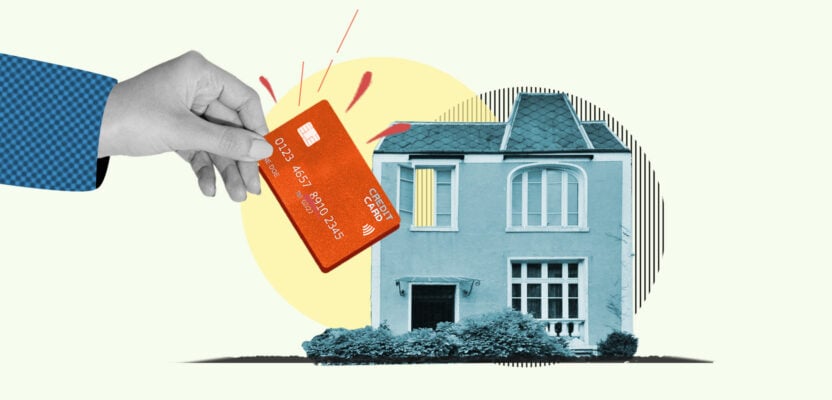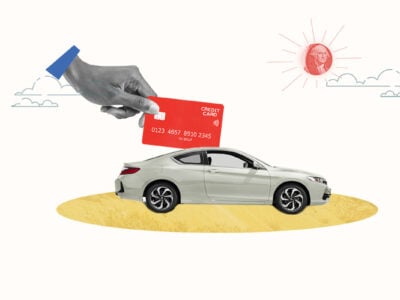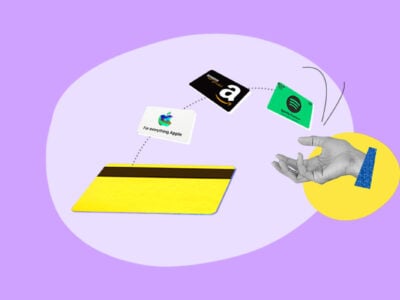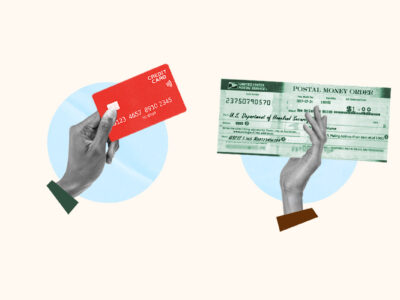Credit cards are great financial tools for making everyday purchases, earning rewards, and building credit. But there are limits to when, where, and how you can use them.
When it comes to using a credit card to pay rent, it’s absolutely possible to do so. However, there are pros and cons that you need to consider before charging your housing costs to your card.
Read on to learn how to pay your rent with a credit card, what the benefits and disadvantages are, and whether it’s the right choice for you.
Table of Contents
Can I pay rent with a credit card?
Yes, you can use a credit card to pay rent. Your credit card issuer almost certainly allows this.
However, many landlords only allow tenants to pay rent with paper checks or cash, as credit card processing comes at a cost. If your landlord has a policy against credit card payments, it’s still possible to pay with your card, but you’ll need to use a workaround.
There are two methods of paying rent with a credit card:
- If your landlord accepts credit cards: Some landlords with multiple properties or who work under property management firms will allow direct rent payments from credit cards. This comes at a cost through credit card processing fees. These fees tend to be 2.5%–2.9% of the transaction amount, which your landlord will likely tack onto your rent payment. 1
- If your landlord doesn’t accept credit cards: If your landlord only allows checks or cash for rent payments, you can use a third-party rent payment service to pay your rent with a credit card. You make your rent payment (and the fee they charge) to the third-party service by credit card, and they’ll convert your payment into a check and send it to your landlord.
How to pay rent with a credit card
As mentioned, there are two ways to pay rent with a credit card. Here’s how to use either one to make your payments.
Pay rent directly to your landlord
If your landlord does accept credit card payments, all you have to do is give them your credit card details and authorize them to make the transaction.
Before you commit, make sure you:
- Understand the fees: Don’t blindly let your landlord charge you convenience fees for credit card processing—ask them how much using a card to pay rent will cost you. If the additional cost seems exorbitant, see if you can negotiate a lower rate. Keep in mind that your landlord will likely take this fee along with the rent payment, so make sure your credit limit on the card will allow for the additional cost.
- Use the right credit card: Using your credit card to pay rent sometimes has advantages (more on that later), especially if you earn rewards for using it. To make the most out of paying rent on your credit card, use a card with a high rewards rate and no rewards cap.
How to pick the best credit card for paying rent
Choosing the right credit card to pay rent with is similar to choosing any other credit card. You want to look for the following features:
- Low APR (aka a low credit card interest rate)
- Low or no fees
- High rewards rate
- No rewards cap (or a generous one)
If you’re looking for a new card and plan to charge rent on it, consider getting a card like the Bilt Mastercard®. In addition to its cashback rewards and lack of an annual fee, it’s specifically designed to be a rent-paying card, which means it offers several very attractive features:
- No processing fees: The Bilt Mastercard® is the only credit card on the market that will waive your rent processing fee.
- Cashback rewards on rent: This card specifically earns you points on rent (1 point per $1 spent on rent, up to $50,000/year).
- Redeemable towards rent: Additionally, Bilt rewards can be redeemed directly toward your future rent payments.
Although the Bilt Mastercard® is arguably the best rent-paying card around at the moment, it does have downsides. For example, the rent rewards are capped yearly, it can have a high APR, and it’s only available to borrowers with good credit. If you decide to look for another card, that’s a valid choice, but try to find one with a similar profile.
Pay rent through a rent payment service
If your landlord doesn’t directly accept credit card payments for rent, you’ll need to use a third-party rent payment service. Rent payment services usually accept the following types of payments:
- Credit card
- Debit card
- Automated clearing house (ACH)
- Wire transfer
The rent payment service will then take your payment and convert it into a check to send to your landlord.
Potential downsides of rent-paying services
There are two aspects of this process you want to be cautious of:
- Your payment won’t go through immediately: There will be a delay between when you send your payment to the third-party service and when the final rent payment gets to your landlord. Make sure you pay the service in advance to avoid getting hit with late fees or penalties. The best way to ensure your check makes it in on time is to set up autopay from your credit card to the payment service. Leave enough time before your rent due date for the service to process your charge, make out the check, and send the money to your landlord.
- The service will charge a fee: Similar to what you’d need to pay if you paid with your credit card directly to your landlord, you’ll need to add money on top of your rent payment to cover the credit card processing fee. Rather than customizing these fees based on the credit card, each rent payment service lists its own flat fee for credit card processing. You can compare the rates between several popular rent payment services below.
Comparing rent payment services
| Rent payment service | Credit card fee | Cards accepted |
|---|---|---|
| Plastiq | 2.85% | American Express, Discover, Mastercard, Visa, Diners Club |
| PlacePay | 2.99% | American Express, Discover, Mastercard, Visa |
| RentTrack | 2.95% | N/A |
| RentMoola | 2.99% | American Express, Mastercard, Visa |
| Venmo | 3% | American Express, Discover, Mastercard, Visa |
Benefits of paying rent with a credit card
Whether you’re paying rent with your credit card out of necessity or as a credit hack, there are multiple benefits to doing so.
1. Build credit
Responsibly using a credit card is one of the best ways to build credit. Credit card companies generally report your borrowing activities to one or more of the three major credit bureaus (Experian, Equifax, and TransUnion). These bureaus then generate your credit reports, which are used to update your credit score.
As having a good credit score allows you to qualify for loans, pass background checks (e.g., from potential landlords and employers), and be approved for the best credit cards, keeping your score high is very important.
If you regularly use your credit card to pay rent and pay the resulting credit card balance off on time each month, that responsible borrowing will be reported to the bureaus and will improve your credit score.
2. Earn rewards
Regularly making large purchases (like rental payments) on a rewards credit card can earn you points, cash back, miles, or other perks. Especially if you have a rewards card with unlimited rewards (i.e., it doesn’t cap your earning potential), paying rent on credit could get you a handsome refund through rewards.
However, if you’re paying rent with a credit card for the sole purpose of earning rewards, remember that credit card processing comes with a fee. Your rewards rate needs to be higher than the fee you pay, otherwise you’re ultimately losing money even if you’re earning rewards.
3. Nab a welcome bonus
Many rewards credit cards offer welcome bonuses to new cardholders. However, most of these bonuses are contingent on how much you spend in a certain period of time.
For example, you might get an extra $100 cash back if you spent $3,000 in the first 3 months of card ownership, or 25,000 points if you put $5,000 on your card in the first year.
If you have a new credit card with a generous bonus offer, putting a rent payment or two on the card could help you quickly meet the minimum requirement.
4. Buy some time
Of course, credit cards are many people’s number one financial safety net. If you’re tight on cash between paychecks and don’t want to suffer the consequences of a late rent check, you can use your credit card to cover the cost.
Just make sure you have enough to pay off your credit card on time and meet the following month’s rent payment, as leaving unpaid balances and living paycheck-to-paycheck can quickly spiral into having too much credit card debt.
Drawbacks of paying rent with a credit card
While paying rent with a credit card can be useful, it’s not a good strategy for everyone. Before committing to paying your rent on credit, understand the disadvantages.
1. Expensive fees
Again, paying rent by credit card means paying processing fees. As these fees are percentage-based, meaning they’re determined by the size of the transaction, processing fees on something as costly as rent could easily add up.
Say your monthly rent is $1,700 and your credit card processing fee is 3%. This adds an extra $51 onto your rent charge (because $1,700 × .03 = $51).
You may be able to compensate for these fees if your rewards rate is high enough. For example, if you have a credit card that offers 4 points per $1 spent (a rewards rate of 4%), your cash back on that $1,700 rent would be $68, meaning you would make $17 in profit after the processing fee.
However, rewards rates this high are highly uncommon, so it’s very likely you’ll be spending more in processing fees than you’ll earn in rewards.
2. Interest charges
Leaving a balance on your credit card from one month to the next leads to interest charges. Credit card interest rates are listed on a per-year basis and are referred to as annual percentage rates (APRs).
Say your card’s APR is 20%. That divided by 12 months gets your approximate monthly interest rate of 1.6%.
Returning to the example above, if you leave a rent charge of $1,700 on that credit card, you’ll accumulate $27.20 in interest the first month ($1,700 x .016). As credit card interest is compounding, you’ll owe even more in interest the following month: $27.64 ($1,727.20 x .016). This means you racked up nearly $55 in interest over the course of just two months.
As you can see, leaving large balances on your credit card can incur quickly increasing interest charges. Make sure you can pay your balance within the month if you’re going to pay rent with your credit card.
3. High credit utilization rate
Lastly, using your credit card to pay rent could damage your credit score by raising your credit utilization rate. Credit utilization is the ratio of credit you’re currently using to your total available credit. In other words, it’s a number that shows how much you’re borrowing—and it plays a big role in your credit score.
Credit experts recommend keeping your credit utilization rate below 30%, with 10% and under being the ultimate goal to maintain a healthy credit score.
Taking out large sums of money—like rent payments—can raise your credit utilization rate significantly. To check where your rate stands, you can divide your total outstanding balance (across all your open credit cards) by your total available credit (again, across all your cards).
If charging rent to your card puts you well above the 30% mark, you may want to reconsider.
4. Maxed out credit cards
If your credit limit isn’t much higher than your rental payments, using your credit card to pay rent could easily cause you to max it out.
Not only does maxing out your credit card hurt your credit score, but it also leaves you without an emergency fund. If you pay rent on credit and aren’t able to pay it back right away, you could be leaving yourself without emergency reserves.
Given the cost of living in this day and age and the unexpected expenses that often come up, we recommend always leaving some unused credit on your cards.
Should I pay rent with a credit card?
You should consider paying rent with a credit card if you:
- Have a high enough credit limit
- Are confident you can pay off your balance without incurring late fees or a lot of interest
- Earn rewards that outweigh the costs of credit card processing
You may be considering habitually paying rent with a credit card, or just using your card once during a tight financial month. Either way, whether or not you should charge rent on your credit card depends on your financial situation and whether you’re comfortable taking on the risks outlined above.






